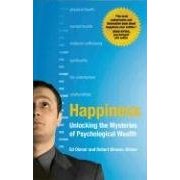People have asked moral questions about the conduct of science, which has led to things like rules for how experiments should be conducted among other things. And psychologists have studied morality, beginning most notably with Lawrence Kohlberg who studied the structure of moral decision-making and came up with a hierarchical model with six stages of moral development based on reasoning about justice.
Recently psychologists who study happiness have come up with a few things related to morality that are interesting. I talked recently about the analysis of conservative and liberal morality undertaken by positive psychologist Jonathan Haidt. Another psychologist touched on the issue indirectly in a presentation at the TED (Technology, Entertainment, Design) conference in 2004. Dan Gilbert of Harvard University is an entertaining and informative speaker and author who recently published the bestseller Stumbling on Happiness, a delightful read in which he explains that we’re not always very good at predicting what is actually going to make us happy.
In the video of the TED conference presentation below, professor Gilbert talks about some aspects of what really makes people happy, including what he calls “synthetic happiness.” A lot of it is up to us. Being in a frame of mind where you are second-guessing an earlier decision is not conducive to happiness; sometimes it’s better for choices to be bounded. On the other hand, the environmental circumstances people find themselves in are not nearly as important as most people assume, because we’re quite good at adapting to both good and bad circumstances. Think about it: so many people make a lot of effort to make money, get a nicer house, car, clothes, furniture, electronic gadgets, etc. And some people strain so much in pursuit of such things that they’re willing to fudge something, to bend the rules – perhaps even enough to regret it later if they’re really honest with themselves. Dr. Gilbert quotes Adam Smith as having expressed a “turgid truth” in his description of pursuing such situations:
“Some of those situations may, no doubt, deserve to be preferred to others; but none of them can deserve to be pursued with that passionate ardour which drives us to violate the rules of either of prudence or of justice, or to corrupt the future tranquility of our minds, either by shame from the remembrance of our own folly, or by remorse from the horror of our own injustice.”
Having that thing you wanted so much is probably not going to make you nearly as happy in the long run as you thought anyway. So if in order to get it you need to cheat or otherwise do something that makes you feel not quite as good about yourself later, why do it? There may be other, even better reasons not to do it, but I thought the fact that Gilbert’s studies and conclusions had shed some light on this reason was interesting.
![[Circle]](http://www.meaningandhappiness.com/pictures/GoldCircle36i.png)


